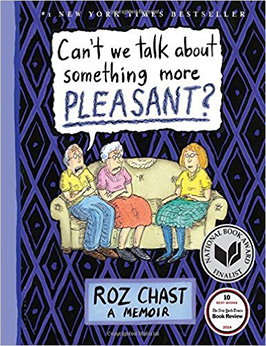Can’t We Talk about Something More Pleasant? by Roz Chast

In her first memoir, Roz Chast brings her signature wit to the topic of aging parents. Spanning the last several years of their lives and told through four-color cartoons, family photos, and documents, and a narrative as rife with laughs as it is with tears, Chast’s memoir is both comfort and comic relief for anyone experiencing the life-altering loss of elderly parents.
When it came to her elderly mother and father, Roz held to the practices of denial, avoidance, and distraction. But when Elizabeth Chast climbed a ladder to locate an old souvenir from the “crazy closet”―with predictable results―the tools that had served Roz well through her parents’ seventies, eighties, and into their early nineties could no longer be deployed. While the particulars are Chast-ian in their idiosyncrasies―an anxious father who had relied heavily on his wife for stability as he slipped into dementia and a former assistant principal mother whose overbearing personality had sidelined Roz for decades―the themes are universal: adult children accepting a parental role; aging and unstable parents leaving a family home for an institution; dealing with uncomfortable physical intimacies; managing logistics; and hiring strangers to provide the most personal care.
No. 1 New York Times Bestseller
Editorial Reviews
From Booklist
Reviews
By turns grim and absurd, deeply poignant and laugh-out-loud funny. Ms. Chast reminds us how deftly the graphic novel can capture ordinary crises in ordinary American lives. (Michiko Kakutani, New York Times)
A tour de force of dark humor and illuminating pathos about her parents’ final years as only this quirky genius of pen and ink could construe them. (Elle)
An achievement of dark humor that rings utterly true. (Washington Post)
Better than any book I know, this extraordinarily honest, searing and hilarious graphic memoir captures (and helps relieve) the unbelievable stress that results when the tables turn and grown children are left taking care of their parents. . . [A] remarkable, poignant memoir. (San Francisco Chronicle)
Very, very, very funny, in a way that a straight-out memoir about the death of one’s elderly parents probably would not be . . . Ambitious, raw and personal as anything she has produced. (New York Times)
Joins Muriel Spark’s Memento Mori, William Trevor’s The Old Boys, and Kingsley Amis’s Ending Up in the competition for the funniest book about old age I’ve ever read. It is also heartbreaking. (Barnes & Noble Review)
Revelatory. So many have faced (or will face) the situation that the author details, but no one could render it like she does. A top-notch graphic memoir that adds a whole new dimension to readers’ appreciation of Chast and her work. (Kirkus Reviews (starred review))
Chast is at the top of her candid form, delivering often funny, trenchant, and frequently painful revelations — about human behavior, about herself — on every page. (David Small, author of Stitches)
Roz Chast squeezes more existential pain out of baffled people in cheap clothing sitting around on living-room sofas with antimacassar doilies in crummy apartments than Dostoevsky got out of all of Russia’s dark despair. This is a great book in the annals of human suffering, cleverly disguised as fun. (Bruce McCall, author of Bruce McCall’s Zany Afternoons)
It is in that sense of having ‘nailed it’ – of providing a detailed, funny, heart breaking and true description of what it is like to care for and lose elderly patients – that this book will find its greatest impact. As points for discussion and for reflection, and as a means of reassurance, this work will offer to many the validation and support of their imperfect roles as imperfect caregivers. It is a great resource. (Kenneth Rockwood, University of Manchester, UK Age and Ageing 2014-09-17)
Book Description
Something completely new from New Yorker cartoonist Roz Chast, a graphic memoir that walks the line between poignancy and humor as she tells the personal story of her parents’ final years.
About the Author
Roz Chast grew up in Brooklyn. Her cartoons began appearing in the New Yorker in 1978. Since then, she has published more than one thousand cartoons in the magazine. She has written and illustrated many books, including What I Hate: From A to Z, and the collections of her own cartoons The Party After You Left and Theories of Everything. This is her first memoir. www.rozchast.com


Leave a Comment
You must be logged in to post a comment.